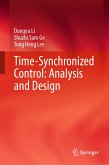Nonsmooth Lyapunov Analysis in Finite and Infinite Dimensions provides helpful tools for the treatment of a broad class of dynamical systems that are governed, not only by ordinary differential equations but also by partial and functional differential equations. Existing Lyapunov constructions are extended to discontinuous systems-those with variable structure and impact-by the involvement of nonsmooth Lyapunov functions. The general theoretical presentation is illustrated by control-related applications; the nonsmooth Lyapunov construction is particularly applied to the tuning of sliding-mode controllers in the presence of mismatched disturbances and to orbital stabilization of the bipedal gate. The nonsmooth construction is readily extendible to the control and identification of distributed-parameter and time-delay systems.
The first part of the book outlines the relevant fundamentals of benchmark models and mathematical basics. The second concentrates on theconstruction of nonsmooth Lyapunov functions. Part III covers design and applications material.
This book will benefit the academic research and graduate student interested in the mathematics of Lyapunov equations and variable-structure control, stability analysis and robust feedback design for discontinuous systems. It will also serve the practitioner working with applications of such systems. The reader should have some knowledge of dynamical systems theory, but no background in discontinuous systems is required-they are thoroughly introduced in both finite- and infinite-dimensional settings.
Dieser Download kann aus rechtlichen Gründen nur mit Rechnungsadresse in A, B, BG, CY, CZ, D, DK, EW, E, FIN, F, GR, HR, H, IRL, I, LT, L, LR, M, NL, PL, P, R, S, SLO, SK ausgeliefert werden.
Es gelten unsere Allgemeinen Geschäftsbedingungen: www.buecher.de/agb
Impressum
www.buecher.de ist ein Internetauftritt der buecher.de internetstores GmbH
Geschäftsführung: Monica Sawhney | Roland Kölbl | Günter Hilger
Sitz der Gesellschaft: Batheyer Straße 115 - 117, 58099 Hagen
Postanschrift: Bürgermeister-Wegele-Str. 12, 86167 Augsburg
Amtsgericht Hagen HRB 13257
Steuernummer: 321/5800/1497
USt-IdNr: DE450055826
Bitte wählen Sie Ihr Anliegen aus.
Rechnungen
Retourenschein anfordern
Bestellstatus
Storno









